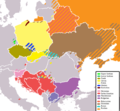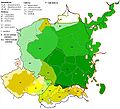Slavic languages
Slavic languages form a group of languages within the larger Indo-European language family. They are spoken by the Slavic peoples and are subdivided into three subgroups: East Slavic, West Slavic, and South Slavic. The Slavic languages are geographically distributed broadly across Eastern Europe and Northern Asia.
Classification[edit]
The Slavic languages are classified into three main branches:
- East Slavic, which includes Russian, Ukrainian, and Belarusian.
- West Slavic, which encompasses Polish, Czech, Slovak, and the Sorbian languages.
- South Slavic, which is divided into two subgroups: the Western subgroup, including Slovene, Croatian, Bosnian, and Serbian; and the Eastern subgroup, comprising Bulgarian and Macedonian.
Characteristics[edit]
Slavic languages share several linguistic features, which include:
- A rich inflectional system, which modifies the form of words to express grammatical relationships and functions.
- Extensive use of prefixes and suffixes to form new words and express nuances of meaning.
- The presence of the Common Slavic aspect, a grammatical feature that indicates the completeness or duration of an action.
- A common set of phonological features, such as the palatalization of consonants.
History[edit]
The Slavic languages descended from Proto-Slavic, the reconstructed ancestor language of all Slavic languages. Proto-Slavic began to diverge into distinct languages during the 7th century, a process influenced by geographical separation, migration, and the political and cultural contexts of Slavic peoples.
Writing Systems[edit]
The Slavic languages use different writing systems. The Cyrillic alphabet is used by East and some South Slavic languages, while the Latin alphabet is used by West Slavic languages and some South Slavic languages. The choice of alphabet can be traced back to the Christianization of the Slavic peoples, with the Cyrillic alphabet being associated with the Orthodox Christian tradition and the Latin alphabet with the Roman Catholic tradition.
Cultural and Political Significance[edit]
The Slavic languages play a crucial role in the cultural and political identities of the Slavic peoples. Language has been a central element in the formation of modern nations in the Slavic-speaking world, often serving as a marker of national identity.
Challenges and Preservation[edit]
Many Slavic languages face challenges related to language preservation and revitalization, especially minority languages such as the Sorbian languages. Efforts are being made to promote the use of these languages in education and media to ensure their survival.
See Also[edit]

This article is a linguistics stub. You can help WikiMD by expanding it!
-
Slavic languages tree diagram
-
Map of Slavic languages
-
Balto-Slavic languages map
-
Baška tablet
-
Slavic languages tree and map
-
Russian language
-
South Slavic dialect continuum
-
West Slavic languages
Ad. Transform your life with W8MD's Budget GLP-1 injections from $75


W8MD offers a medical weight loss program to lose weight in Philadelphia. Our physician-supervised medical weight loss provides:
- Weight loss injections in NYC (generic and brand names):
- Zepbound / Mounjaro, Wegovy / Ozempic, Saxenda
- Most insurances accepted or discounted self-pay rates. We will obtain insurance prior authorizations if needed.
- Generic GLP1 weight loss injections from $75 for the starting dose.
- Also offer prescription weight loss medications including Phentermine, Qsymia, Diethylpropion, Contrave etc.
NYC weight loss doctor appointmentsNYC weight loss doctor appointments
Start your NYC weight loss journey today at our NYC medical weight loss and Philadelphia medical weight loss clinics.
- Call 718-946-5500 to lose weight in NYC or for medical weight loss in Philadelphia 215-676-2334.
- Tags:NYC medical weight loss, Philadelphia lose weight Zepbound NYC, Budget GLP1 weight loss injections, Wegovy Philadelphia, Wegovy NYC, Philadelphia medical weight loss, Brookly weight loss and Wegovy NYC
|
WikiMD's Wellness Encyclopedia |
| Let Food Be Thy Medicine Medicine Thy Food - Hippocrates |
Medical Disclaimer: WikiMD is not a substitute for professional medical advice. The information on WikiMD is provided as an information resource only, may be incorrect, outdated or misleading, and is not to be used or relied on for any diagnostic or treatment purposes. Please consult your health care provider before making any healthcare decisions or for guidance about a specific medical condition. WikiMD expressly disclaims responsibility, and shall have no liability, for any damages, loss, injury, or liability whatsoever suffered as a result of your reliance on the information contained in this site. By visiting this site you agree to the foregoing terms and conditions, which may from time to time be changed or supplemented by WikiMD. If you do not agree to the foregoing terms and conditions, you should not enter or use this site. See full disclaimer.
Credits:Most images are courtesy of Wikimedia commons, and templates, categories Wikipedia, licensed under CC BY SA or similar.
Translate this page: - East Asian
中文,
日本,
한국어,
South Asian
हिन्दी,
தமிழ்,
తెలుగు,
Urdu,
ಕನ್ನಡ,
Southeast Asian
Indonesian,
Vietnamese,
Thai,
မြန်မာဘာသာ,
বাংলা
European
español,
Deutsch,
français,
Greek,
português do Brasil,
polski,
română,
русский,
Nederlands,
norsk,
svenska,
suomi,
Italian
Middle Eastern & African
عربى,
Turkish,
Persian,
Hebrew,
Afrikaans,
isiZulu,
Kiswahili,
Other
Bulgarian,
Hungarian,
Czech,
Swedish,
മലയാളം,
मराठी,
ਪੰਜਾਬੀ,
ગુજરાતી,
Portuguese,
Ukrainian






